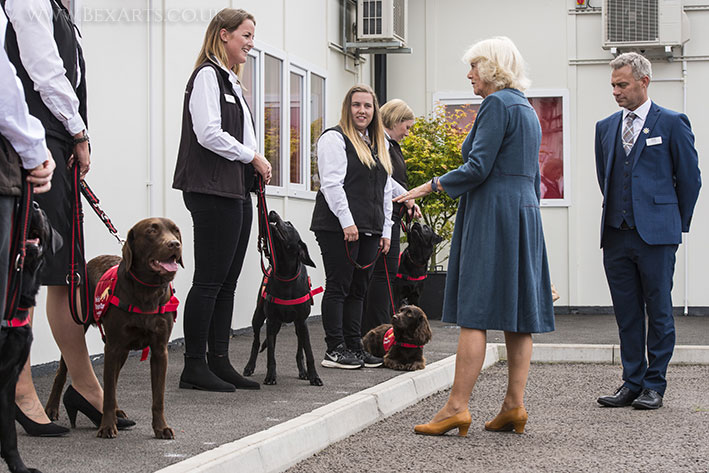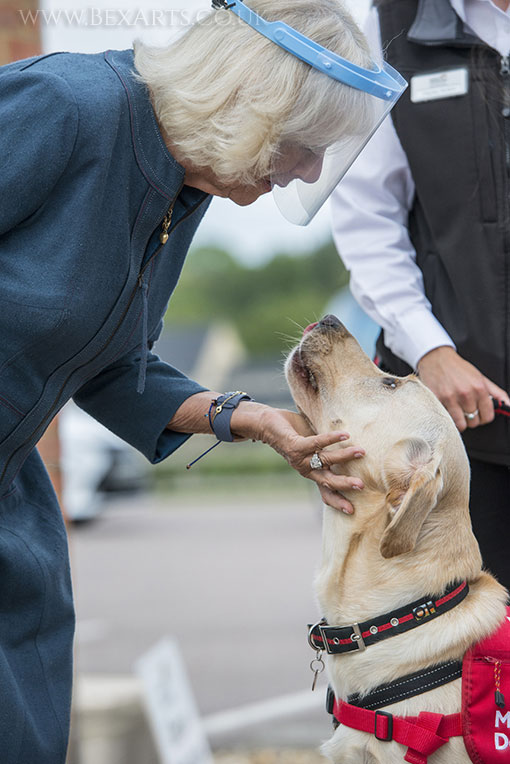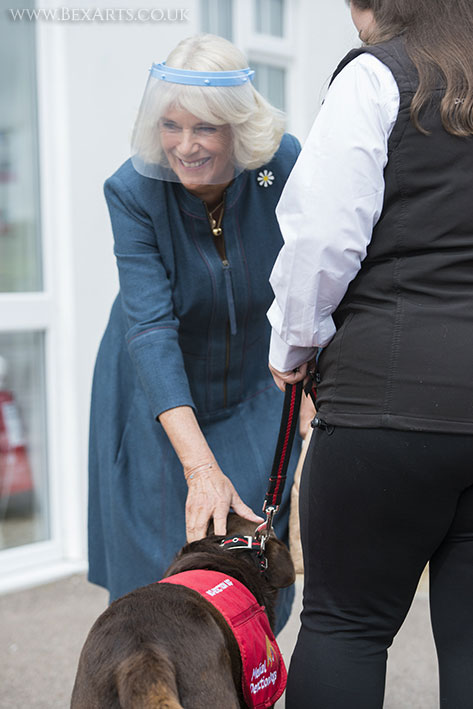COVID-19 Detection Dogs in the presence of royalty

Her Royal Highness was greeted on arrival by some of our Bio Detection Dogs and accompanied by our CEO, Claire Guest, as she toured our training centre where the trials are currently underway.
The project is a collaboration between Medical Detection Dogs, The London School of Hygiene & Tropical Medicine and Durham University to train an elite team of super sniffers as a potential non-invasive detection approach for the virus in the future. It is hoped the dogs will be able to detect the virus even on asymptomatic patients.
First, The Duchess was wowed by working cocker spaniel, Asher, and fox red Labrador, Belle, as they worked the stands in the training room.
Then she moved to the Cowan Suite where she watched chocolate Labrador, Bea, and black Labrador, Marley, portray passive screening – where the dogs went up and down a queue of people to detect the smell, as they could in public places such as airports during Phase 2 of our trial. A dog could potentially screen as many as 250 people per hour this way – more fast and efficient than any other current testing methods.
But now the team urgently need the public to help by donating odour samples. Anyone in England who has mild COVID-19 symptoms, and is due to have a swab test, or has had a swab test in the past 24 hours can help and it’s really simple. All you have to do is wear a mask for three hours and nylon socks and a t-shirt for 12 hours to provide samples of breath and body odour.
Once the samples have been collected, they are first taken to the London School of Hygiene & Tropical Medicine for preparation and then sent to Medical Detection Dogs where the dogs are trained to identify the virus from the samples.
To find out more about volunteering, please call 0207 927 2777 or send an email to [email protected].
More information about volunteering for the study can be found at: https://www.lshtm.ac.uk/research/centres-projects-groups/using-dogs-to-detect-covid-19#volunteer-for-the-study
Her Royal Highness said: “First of all, I would like to thank everybody here who does such a fantastic job to keep everything going through these difficult times.
I also wanted to say, it’s entirely due to Claire who started this, that when I first visited, you were literally a porta cabin with one dog. From the minute I visited you, I just knew that there was something very special about these dogs and as we’ve seen today with COVID, how quickly they’re learning to sniff the scent.
It will be a game changing moment for this country and the world, and luckily it’s Britain that is leading the way. But we do need help, we do need more positive samples. If we can appeal to all hospitals to please, please give the Medical Detection Dogs these samples because they are going to help to save thousands of lives, and I think that it is so important. Also, we need more dogs, we need more handlers, we need more foster homes…
This is a game changing moment and I really do urge everybody, if they can, to please help us. [Bark] We’ve got a dog agreeing.
Thank you very much’
Claire Guest, CEO and Co-Founder of Medical Detection Dogs, said: “We are very proud that Her Royal Highness has been our Patron since 2014 and delighted to be able to show her our dogs working on COVID-19 samples. It is vital that we train our dogs to detect the odour of COVID-19 as soon as possible so we can help ensure people move about freely and safely. Public support is essential in making this possible. Anyone who assists us by providing samples will be playing a part in creating a fast, effective and non-invasive diagnosis for the virus and safer spaces for us all.”


Professor James Logan, Head of the Department of Disease Control at the London School of Hygiene & Tropical Medicine, said: “I’m delighted HRH The Duchess of Cornwall has been able to get an insight into the vital work we’re doing with these dogs, while meeting some incredibly smart furry friends. This trial could allow us to rapidly screen high numbers of people, even those who are asymptomatic, if successful. It could revolutionise how we diagnose this virus, helping return our lives back to some sort of normality.”
Professor Steve Lindsay, from the Department of Biosciences at Durham University, said: “If we can show that our trained dogs can identify people carrying the virus, but who are not sick, it will be a game changer. We will then be able to scale-up the use of dogs at ports of entry to identify travellers entering the country with the virus. This could be very important to help prevent a second wave of the epidemic.”
